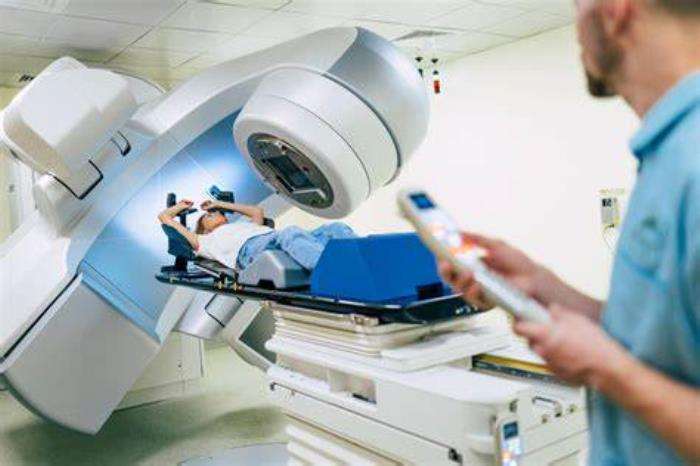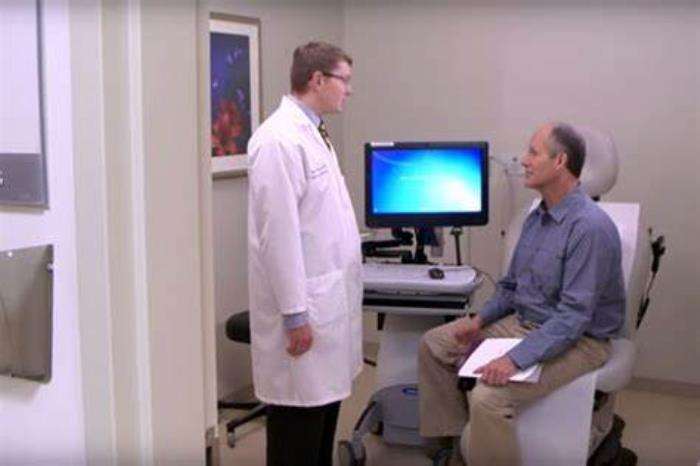A bone marrow transplant (BMT) is a medical procedure used to replace damaged or destroyed bone marrow with healthy bone marrow stem cells. This treatment is often indicated for patients with various hematological malignancies such as leukemia, lymphoma, and multiple myeloma, as well as certain genetic disorders and aplastic anemia. The procedure aims to restore the body’s ability to produce healthy blood cells, which is crucial for maintaining overall health and immune function.
Medical disclaimer: This content is for general awareness and does not replace a doctor’s consultation. For diagnosis or treatment decisions, consult a qualified specialist.
Understanding Radiation Therapy
Radiation therapy is a treatment that uses high doses of radiation to kill or damage cancer cells. It can be delivered externally via a machine or internally through radioactive substances. Radiation therapy is often employed in conjunction with other treatment modalities, such as chemotherapy and surgery, to enhance overall treatment efficacy. Its primary role in cancer treatment includes shrinking tumors, reducing the risk of recurrence, and alleviating symptoms.
The Role of Radiation Therapy in BMT
In the context of bone marrow transplants, radiation therapy serves a critical preparatory function. Prior to the transplant, patients often undergo a regimen known as conditioning therapy, which may include radiation. This process aims to eradicate any remaining cancer cells and suppress the immune system to prevent rejection of the transplanted cells. The use of radiation therapy can significantly improve the chances of a successful transplant.

Types of Radiation Therapy Used in BMT
There are two primary types of radiation therapy utilized in the context of bone marrow transplants: total body irradiation (TBI) and localized radiation therapy. TBI involves administering radiation to the entire body, which is particularly effective in treating systemic diseases. Localized radiation therapy targets specific areas where cancer is present, minimizing exposure to surrounding healthy tissues. Both methods aim to create an optimal environment for the transplanted cells to engraft successfully.
Benefits of Radiation Therapy in Bone Marrow Transplants
The incorporation of radiation therapy into the bone marrow transplant process offers numerous benefits. Primarily, it enhances the likelihood of successful engraftment of the transplanted cells by reducing the tumor burden and preventing immune rejection. Additionally, radiation can alleviate symptoms associated with malignancies, improving the patient's quality of life. The careful application of radiation therapy is crucial for optimizing outcomes in BMT procedures.
Risks and Side Effects of Radiation Therapy
While radiation therapy is beneficial, it is not without risks. Potential side effects can include fatigue, skin irritation, and damage to surrounding healthy tissues. Long-term effects may involve an increased risk of secondary cancers or organ dysfunction, depending on the radiation dose and targeted areas. It is essential for healthcare providers to discuss these risks with patients and monitor them closely throughout the treatment process.
Patient Selection for Radiation Therapy in BMT
Not all patients undergoing bone marrow transplants require radiation therapy. The decision to include this treatment modality is influenced by various factors, including the type and stage of the disease, the patient’s overall health, and the specific transplant protocol. A thorough evaluation by a multidisciplinary team is essential to determine the most appropriate approach for each patient, ensuring that the benefits outweigh the potential risks.
Timing of Radiation Therapy in BMT
The timing of radiation therapy is critical in the context of bone marrow transplants. Typically, radiation is administered as part of the conditioning regimen before the actual transplant. This timing allows for the effective eradication of malignant cells and prepares the bone marrow niche for the incoming stem cells. Post-transplant radiation therapy may also be considered in certain cases to address residual disease or prevent relapse.
Monitoring and Follow-up After Radiation Therapy
Post-radiation therapy monitoring is vital to assess the patient’s recovery and detect any potential complications early. Regular follow-ups may include blood tests to evaluate blood cell counts, imaging studies to monitor for residual disease, and assessments for any late effects of radiation. A comprehensive follow-up plan tailored to the individual patient is essential for optimizing long-term outcomes after a bone marrow transplant.

Role of Multidisciplinary Teams in Managing Radiation Therapy
Effective management of radiation therapy in bone marrow transplants requires a multidisciplinary approach. Oncologists, radiation therapists, transplant surgeons, and nursing staff must collaborate closely to develop individualized treatment plans. This team-based approach ensures that all aspects of patient care are addressed, including the management of side effects and support for the patient and their family throughout the treatment journey.
Innovations in Radiation Therapy Techniques
Recent advancements in radiation therapy techniques have significantly improved the precision and efficacy of treatment. Techniques such as intensity-modulated radiation therapy (IMRT) and stereotactic body radiation therapy (SBRT) allow for more targeted delivery of radiation, minimizing damage to healthy tissues. These innovations enhance the safety profile of radiation therapy, making it a more viable option for patients undergoing bone marrow transplants.
Patient Education on Radiation Therapy
Patient education is a crucial component of the radiation therapy process in bone marrow transplants. Healthcare providers should ensure that patients understand the purpose of radiation, the expected benefits, potential side effects, and the overall treatment plan. Providing clear and comprehensive information empowers patients to make informed decisions and actively participate in their care, ultimately leading to better outcomes.
Psychosocial Considerations in Radiation Therapy
The psychosocial impact of radiation therapy in the context of bone marrow transplants should not be overlooked. Patients may experience anxiety, depression, or fear related to their diagnosis and treatment. Addressing these concerns through counseling, support groups, and mental health resources is essential for promoting emotional well-being and improving the overall treatment experience. A holistic approach to care enhances the patient’s quality of life during this challenging time.
Research and Future Directions in Radiation Therapy
Ongoing research is essential for advancing the field of radiation therapy in bone marrow transplants. Investigations into novel radiation techniques, combination therapies, and personalized treatment approaches are underway. Clinical trials are exploring the efficacy of integrating radiation with immunotherapy and targeted therapies, aiming to enhance treatment outcomes and reduce adverse effects. Staying abreast of these developments is critical for healthcare professionals involved in BMT.
Ethical Considerations in Radiation Therapy
Ethical considerations play a significant role in the administration of radiation therapy for bone marrow transplants. Healthcare providers must navigate complex decisions regarding treatment options, informed consent, and the management of potential risks. Open communication with patients about the benefits and limitations of radiation therapy is vital to ensure that treatment decisions align with the patient’s values and preferences.
Case Studies Highlighting Radiation Therapy in BMT
Case studies provide valuable insights into the practical application of radiation therapy in bone marrow transplants. These real-world examples illustrate the diverse scenarios in which radiation therapy is utilized, the outcomes achieved, and the lessons learned. Analyzing these cases can inform clinical practice and contribute to the ongoing improvement of treatment protocols in BMT.
Global Perspectives on Radiation Therapy in BMT
The application of radiation therapy in bone marrow transplants varies across different healthcare systems and regions. Global perspectives highlight disparities in access to advanced radiation technologies, treatment protocols, and patient outcomes. Understanding these differences is crucial for healthcare professionals to advocate for equitable care and contribute to the development of best practices in radiation therapy for BMT.
Conclusion: The Integral Role of Radiation Therapy in BMT
In conclusion, radiation therapy plays an integral role in the success of bone marrow transplants. By effectively preparing patients for transplantation and enhancing the likelihood of successful engraftment, radiation therapy significantly impacts patient outcomes. Continuous advancements in radiation techniques and a focus on patient-centered care will further enhance the efficacy and safety of this treatment modality in the future.
Best Bone Marrow Transplant in India
The Best Bone Marrow Transplant in India provides a vital treatment option for blood disorders and cancers, offering renewed hope through advanced medical techniques and high success rates.
Best Bone Marrow Transplant Hospitals in India
The Best Bone Marrow Transplant Hospitals in India are equipped with state-of-the-art technology and experienced hematologists, ensuring safe procedures and comprehensive patient care.
Bone Marrow Transplant Cost in India
The Bone Marrow Transplant Cost in India is affordable and competitive, providing access to quality care with transparent pricing for international and domestic patients.
Best Bone Marrow Transplant Specialists in India
The Best Bone Marrow Transplant Specialists in India are highly skilled in performing successful transplants, offering personalized care and advanced therapies tailored to individual patient needs.
FAQs
What is the primary purpose of radiation therapy in bone marrow transplants?
The primary purpose of radiation therapy in bone marrow transplants is to prepare the patient for the transplant by eradicating cancer cells and suppressing the immune system to prevent rejection of the transplanted cells.
Are there alternative treatments to radiation therapy before a BMT?
Yes, chemotherapy is often used as an alternative or complementary treatment to radiation therapy before a bone marrow transplant. The choice depends on the individual patient’s condition and treatment goals.
How long does radiation therapy take in the context of BMT?
The duration of radiation therapy varies but typically lasts from a few days to several weeks, depending on the treatment plan and the radiation dose required for effective conditioning.
What are the common side effects of radiation therapy?
Common side effects of radiation therapy include fatigue, skin irritation, nausea, and a temporary decrease in blood cell counts. Long-term effects may also occur, which should be monitored by healthcare providers.
How can patients manage the side effects of radiation therapy?
Patients can manage side effects through supportive care measures, including medications for nausea, hydration, and nutritional support. Open communication with healthcare providers is essential for addressing any concerns.
Artificial bone marrow, aiming to replicate natural marrow's function, could revolutionize treatments for blood disorders, offering safer, more accessible alternatives to transplants. Artificial Bone Marrow: Is It a Future Alternative?
Explore the distinctions and applications of Cord Blood Transplant compared to traditional Bone Marrow Transplant, highlighting benefits, challenges, and future prospects in a comprehensive, medically precise context. Cord Blood Transplant: How It Compares to Traditional BMT
Explore how CRISPR gene editing is transforming bone marrow transplants, enhancing compatibility, reducing rejection, and promising a future with genetically tailored treatments. The Role of CRISPR Gene Editing in Bone Marrow Transplants